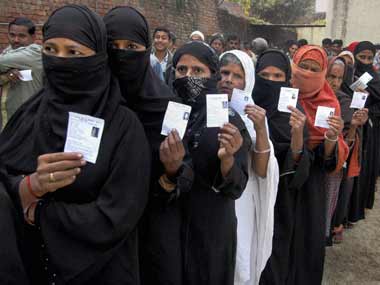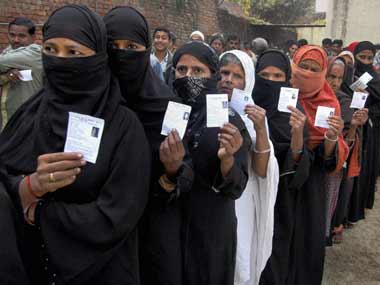We do not yet know who is responsible for the bomb blasts at Narendra Modi’s massive Patna rally yesterday that killed five people and injured scores. But we do know one thing: they have succeeded in vitiating the political atmosphere further. This is apparent from the negative and bitter positions taken by all political parties after the blasts. [caption id=“attachment_119836” align=“alignleft” width=“380”]
 A file photograph of Muslim voters in Uttar Pradesh. PTI[/caption] It is also a confirmation of the political narrative hatched by Modi’s detractors: to show that he is inherently divisive and hence responsible for all the bad things that happen during the course of this election campaign. Janata Dal (U) CM Nitish Kumar said “Bihar has never had a tradition of violence and such attacks have never taken place before.” Really? What were the Bodh Gaya blasts about? His party spokesperson Sabir Ali hinted on TV that these things were happening only because of certain developments of the last few months. I have no doubt the only development he was referring to related to Modi’s emergence on the national scene. And Digvijaya Singh’s prime concern in a tweet was to point out the coincidence between Modi’s rally and the blasts The purpose of this article is not to speculate on who caused the blasts and who will benefit from it (as if that is the most important question when blood is being callously spilt), but how the politics of hate is really flowing in the reverse direction as well. It is assumed that the BJP has the copyright on hate-mongering, but it is even more true that for the phony secularist, Modi, BJP, the Sangh Parivar and anyone who prefers them is the hated “other”. This politics of reverse hatred is what is manifesting itself repeatedly in election after election and it is being propagated with the singular motive of consolidating a Muslim votebank. The real divisiveness lies in every party trying to prove it is secular by demonising the BJP and, in the process, encouraging - even instigating - the minorities to think they have a veto on who will rule India. This is false empowerment that is resulting in the real marginalisation of the Muslim in the economic sphere even while handing him/her a veto in deciding against the BJP. In the “secular” narrative, the real test of Indian secularism lies in Muslims exercising their power of the veto against Modi or the BJP, and not in treating them like any other citizen with the same basic needs of education, jobs and aspiration. The “secular” gameplan is to use the BJP to frighten the daylights out of the average Muslim so that he exercises his vote to defeat that party and, in the process, forget to demand the real things that matter to him. If Muslims constantly use their vote as veto and nothing positive, can the national atmosphere ever be secular? The communal veto runs counter to the idea of a citizen voting after exercising his or her judgment. When the Muslim is constanty asked to bail out secularism by voting against one party, what is the chance that politics will ever be over real issues? What stake then does that national party have in secularism? It is to their credit that some Muslims are trying to break out of this trap set by the “secular” parties - but so far they have been pushed back into their traditional cubby holes. Consider the long list of Muslims who had to beat a hasty retreat for even hinting that Modi may not be an untouchable: Maulana Vastanvi, Maulana Mahmood Madani, and Maulana Kalbe Sadiq most recently. They have been shouted down as voices unrepresentative of “real Muslims”. Journalist Shahid Siddiqui has been hooted out for merely having the temerity to interview Modi. A Gujarati businessman, Zafar Sareshwala, who has taken the courageous step of opening a dialogue with Modi and, in the process, opening the doors for many Muslims in Gujarat, has been excoriated as a self-serving person who is selling Muslim interests down the Sabarmati. This was the real purpose of Rahul Gandhi’s references to Muzaffarnagar’s Muslims and their alleged dalliance with the ISI - a remark that has boomeranged on him and exposed once again the “secular” effort to treat the BJP as the only communal ogre to scare the minorities into exercising their vote again as veto. The Patna blasts will surely be used to suggest that they happened because of who Modi is, and what the BJP allegedly stands for: hatred and destruction. But there is no one to question that repeated spews out of “secularists”. In 2014, Muslims have one more chance to break out of their isolation by using their vote to think of themselves as citizens and not as a votebank. This doesn’t mean voting for the BJP, but it certainly means voting with their hopes rather than fears. They have to take a chance with some of their choices. India can be truly secular only when it can countenance a so-called communal party in power and the country still remains recognisablly secular at the end of it all. The BJP is also playing into this faulty narrative by being repeatedly shrill on secularism. Its best bet is to stay calm and give Muslims a chance to think for themselves. Veto is an anagram of vote. But the two mean different things. It’s the difference between being driven by fear or hope. It’s about exercising rational choice rather than being reduced to a bundle of negativisms by so-called “secularists”.
A file photograph of Muslim voters in Uttar Pradesh. PTI[/caption] It is also a confirmation of the political narrative hatched by Modi’s detractors: to show that he is inherently divisive and hence responsible for all the bad things that happen during the course of this election campaign. Janata Dal (U) CM Nitish Kumar said “Bihar has never had a tradition of violence and such attacks have never taken place before.” Really? What were the Bodh Gaya blasts about? His party spokesperson Sabir Ali hinted on TV that these things were happening only because of certain developments of the last few months. I have no doubt the only development he was referring to related to Modi’s emergence on the national scene. And Digvijaya Singh’s prime concern in a tweet was to point out the coincidence between Modi’s rally and the blasts The purpose of this article is not to speculate on who caused the blasts and who will benefit from it (as if that is the most important question when blood is being callously spilt), but how the politics of hate is really flowing in the reverse direction as well. It is assumed that the BJP has the copyright on hate-mongering, but it is even more true that for the phony secularist, Modi, BJP, the Sangh Parivar and anyone who prefers them is the hated “other”. This politics of reverse hatred is what is manifesting itself repeatedly in election after election and it is being propagated with the singular motive of consolidating a Muslim votebank. The real divisiveness lies in every party trying to prove it is secular by demonising the BJP and, in the process, encouraging - even instigating - the minorities to think they have a veto on who will rule India. This is false empowerment that is resulting in the real marginalisation of the Muslim in the economic sphere even while handing him/her a veto in deciding against the BJP. In the “secular” narrative, the real test of Indian secularism lies in Muslims exercising their power of the veto against Modi or the BJP, and not in treating them like any other citizen with the same basic needs of education, jobs and aspiration. The “secular” gameplan is to use the BJP to frighten the daylights out of the average Muslim so that he exercises his vote to defeat that party and, in the process, forget to demand the real things that matter to him. If Muslims constantly use their vote as veto and nothing positive, can the national atmosphere ever be secular? The communal veto runs counter to the idea of a citizen voting after exercising his or her judgment. When the Muslim is constanty asked to bail out secularism by voting against one party, what is the chance that politics will ever be over real issues? What stake then does that national party have in secularism? It is to their credit that some Muslims are trying to break out of this trap set by the “secular” parties - but so far they have been pushed back into their traditional cubby holes. Consider the long list of Muslims who had to beat a hasty retreat for even hinting that Modi may not be an untouchable: Maulana Vastanvi, Maulana Mahmood Madani, and Maulana Kalbe Sadiq most recently. They have been shouted down as voices unrepresentative of “real Muslims”. Journalist Shahid Siddiqui has been hooted out for merely having the temerity to interview Modi. A Gujarati businessman, Zafar Sareshwala, who has taken the courageous step of opening a dialogue with Modi and, in the process, opening the doors for many Muslims in Gujarat, has been excoriated as a self-serving person who is selling Muslim interests down the Sabarmati. This was the real purpose of Rahul Gandhi’s references to Muzaffarnagar’s Muslims and their alleged dalliance with the ISI - a remark that has boomeranged on him and exposed once again the “secular” effort to treat the BJP as the only communal ogre to scare the minorities into exercising their vote again as veto. The Patna blasts will surely be used to suggest that they happened because of who Modi is, and what the BJP allegedly stands for: hatred and destruction. But there is no one to question that repeated spews out of “secularists”. In 2014, Muslims have one more chance to break out of their isolation by using their vote to think of themselves as citizens and not as a votebank. This doesn’t mean voting for the BJP, but it certainly means voting with their hopes rather than fears. They have to take a chance with some of their choices. India can be truly secular only when it can countenance a so-called communal party in power and the country still remains recognisablly secular at the end of it all. The BJP is also playing into this faulty narrative by being repeatedly shrill on secularism. Its best bet is to stay calm and give Muslims a chance to think for themselves. Veto is an anagram of vote. But the two mean different things. It’s the difference between being driven by fear or hope. It’s about exercising rational choice rather than being reduced to a bundle of negativisms by so-called “secularists”.
Why Muslims should reject the politics of veto
R Jagannathan
• October 28, 2013, 13:43:35 IST
In 2014, Muslims have one more chance to break out of their isolation by using their vote to think of themselves as citizens and not as a votebank.
Advertisement
)